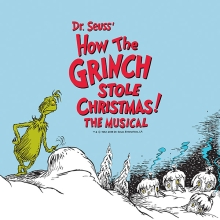Filichia Features: New Year’s Resolutions for 2015
Filichia Features: New Year’s Resolutions for 2015
It’s a new year, which we’re all hoping will be the best we’ve ever had.
One way to make that happen is to make good New Year’s Resolutions.
And keep them.
This year, don’t merely make vows to lose weight, drink less and smoke not at all.
If you produce, direct or perform in musical theater, make some New Year’s Resolutions, too. If you can’t think of any, may I make some suggestions?
1) When I do Once On This Island, I’ll make certain that all my actresses remove ALL fingernail AND toenail polish.
I’ve seen productions where the ends of toes have been reddened, pinked or chartreused. But peasants who live in the French Antilles – and that includes TiMoune, our heroine – don’t have much access to cosmetics. Even if they did, they waste money on such frivolities.
More to the point, Daniel, the high-born man whom TiMoune loves in vain, has a lyric where he refers to Andrea, the high-born woman he’ll marry: “Some girls take hours to paint every perfect nail.” Don’t make your audience wonder if he’s referring to TiMoune.
2) I will pronounce each lyric so that it rhymes with the word it’s supposed to.
At a stock production of Pippin, the woman playing Berthe didn’t do well with the line “When your best days are yester, the rest’re twice as dear.” She didn’t rhyme “yester” with “rest’re,” but pronounced the latter as “rest are.”
No -- “rest are” doesn’t rhyme with “yester” – only “rest’re” does. Similarly speaking, in a production of “Bloomer Girl,” where “smellin’” – no “g” on the end, mind you – was meant to rhyme with “watermelon,” the actor pronounced it as it looks – “mell-UN.” But it needs to be “mell-IN” to rhyme. And for that matter, it is the way, most people say it.
3) After someone on stage gets a laugh – and I have the next line – I’ll wait until everyone in the audience has finished laughing.
When an actor steps on a line, he looks terribly inexperienced. What’s more, that next line might well carry an important piece of exposition, and if the audience doesn’t hear it because it was still laughing, the actor will be doing the crowd a disservice.
4) If the show is set between 1940 and 1964, I will make certain every telephone on stage has a rotary dial.
After all, the earliest push-button phones didn’t hit the market until late 1963. So if you’re doing Happy Hunting (set in the ‘50s), Little Shop of Horrors (which takes place in the ‘60s), search those attics or thrift shops. Hey, even if you’re doing Violet, which is set in September, 1964, get those rotary dial phones, for they weren’t replaced overnight.
5) When I’m on stage dialing a rotary phone, I’ll be realistic.
If you’re supposed to be calling a local number, dial all seven numbers. If you’re calling long distance, do all ten. The audience can wait.
In fact, what’s wrong with even purposely making a mistake and having to hang up and start dialing again? You’ll get a good laugh out of that from people who remember the frustration of getting six of the seven numbers dialed only to fumble on the last number and have to start all over again.
6) If I make an on-stage telephone call, I will pause for a believable length of time before I start the conversation.
Although many directors and actors will do anything to shave off a few seconds of dead air, they shouldn’t save time here. Make your show as realistic as possible. If a character starts talking less than a second after he’s dialed fewer than seven numbers, the reality is gone.
7) When I pour a drink on stage, I will do it realistically.
Over the years, a theatrical convention has evolved in which many a bottle of wine, soda or water has been purposely left empty, and the action of simply pouring it is considered realistic enough. Doing it this way does eliminate the possibility of spillage.
But if you do go this route, at least give the illusion that you’re truly pouring a liquid into a glass. So many actors give a split-second tip of the bottle into the glass before pulling it upright. Unless the script calls for a stingy person to dispense the liquor, take your time in pouring even an imaginary drink.
8) If my set includes a bookcase, I’ll choose the right books for it.
A recent production of Legally Blonde had a bookcase in Callahan’s office that was filled with Reader’s Digest Condensed Books. No, that’s not what a Harvard professor would have in his personal library.
Resist the temptation to fill the shelves with just anything. How well I remember in 2009 when I was emceeing the Theatre World Awards at the Friedman Theatre. Before the show began, I was lolling around the set of the then-current production: “Accent on Youth,” which dealt with Stephen Gaye, a writer. In the bookcase were a bevy of books, each of which was covered with a made-to-order handsome jacket with a made-up title -- but underneath each title were the words “by Stephen Gaye.” I was astonished that set decorators would go to that much trouble.
While this degree of accuracy may be overkill, you should say to yourself before putting any book in a character’s bookcase, “Would this be a book this character would really own?”
Have the right magazines, too. A comedy that played off-Broadway this year concerned an ignorant lower-middle-class family – and one of the dullest relatives was seen reading “American Film” magazine. If the script had established the character as an avid movie aficionado, the choice would have been fine, but there was nothing in the character to suggest that her film-going included much more than “Police Academy (1, 2, 3, 4, 5, AND 6).” I’m sure that this copy of “American Film” was put on stage because someone had retrieved it from the lobby.
8) If I choreograph Big, I will have both Josh and Macmillan actually make music while they dance on the giant piano keys.
In the original Broadway production, the “piano” was not a practical one, so Josh and Macmillan simply did their dancing while a pianist in the orchestra did the actual playing. This hurt the show.
One of the best assets of live theater is, metaphorically speaking, flying without a net (and I don’t just mean Peter Pan). People who come to a live show want to have a fully live experience. Having your Josh and Macmillan actually learn how to “play the piano” with their feet will get cheers from the crowd (which never happened on Broadway in the five times I saw the show there).
“But where do I get such an actual working piano?” you ask. It’s available in six-foot size (which may mean you’ll need two) at $39.95 from Catalog Favorites at 800-221-1133.
9) For male actors only: I will audition for any production of 1776 that comes my way.
For as Rob Maitner pointed out this past July at 54 Below when he emceed 1776 In Concert, an actor can be virtually any age – from a teenager to a septuagenarian – and be right for some role in the Tony-winning classic. Indeed, its characters range from the very young Courier who sings the touching anti-war ballad “Momma, Look Sharp” all the way to Benjamin Franklin, who in real life had recently marked his seventieth birthday as Congress began to debate independency in earnest.
And if you’re young enough for Courier, think of all the productions in your future. As Maitner quipped, “1776 is a pension plan for actors.”
10) If I’m short of performers, I will think of creative ways to accomplish doubling.
Thoroughly Modern Mille never has Mrs. Meers and Miss Flannery appear on stage together. Thus, one actress could play both. Ditto Miss Andrew, the harridan nanny, and Bird Woman in Mary Poppins (which is one reason why director Jennifer Hemme of Green Valley High School in Henderson, Nevada used the same actress earlier this year).
“That’s not my problem,” you say. “I always have plenty of women. But, to cite a Cole Porter lyric, ‘Where Are the Men?’”
Well, if you’re doing Ernest In Love – that hellishly clever musical version of Oscar Wilde’s “The Importance of Being Earnest” – do as Theatre Off Park did in 1980 by having the actor who plays Lane -- Algernon’s butler – also play Merriman – Jack’s butler.
And if you’re staging The Apple Tree, consider doing what a ‘70s Canadian production did with “The Diary of Adam and Eve,” the first of the show’s three one-act musicals.
You know the story: Boy meets Girl, Girl meets Snake. In the original production, Alan Alda played Adam and Larry Blyden portrayed the devilish Snake. If you know your Bible, you know that Snake purposely showed up when Adam wasn’t around – and that he was never seen again.
So actor Tom Kneebone played BOTH Adam and Snake, which actually offered some fascinating subtext. After all, given that Eve is in love with Adam, wouldn’t Snake be smart to resemble the guy?
11) If I’m directing a show with a scene in which one character is lying to another, I won’t have The Liar hesitate before telling the fib.
Think about it: if in real life someone were about to tell you something and said “Uh, uh, well, you see” before imparting information, wouldn’t you immediately infer that he was telling you a lie? Don’t make The Listener seem stupid for not picking up on it.
You may e-mail Peter at pfilichia@aol.com. Check out his weekly column each Tuesday at www.masterworksbroadway.com and each Friday at www.kritzerland.com. His new book, Strippers, Showgirls, and Sharks – a Very Opinionated History of the Broadway Musicals That Did Not Win the Tony Award is now available at www.amazon.com.


























